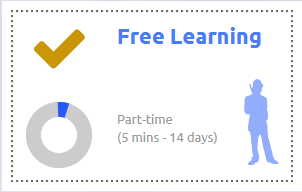You are here
- Home
- Learning
- Free Learning
- Wellbeing and Mental Health
Wellbeing and Mental Health

These free resources are organised into categories aligned to the College of Policing Curriculum and in agreement with police experts. You can study them at any time and anywhere.
Select the duration of study below and you will be taken to resources that match that duration
| An hour or less of study | 1-7 Hours of study | More than 7 hours of study |
|---|
An hour or less of study
Five reasons why you should care about mindfulness
It has stood the test of time – people have been doing mindfulness for centuries. But why does mindfulness matter? Mindfulness is about focusing on the present moment, whilst at the same time accepting your feelings, thoughts, and body’s sensations. This short introductory to course gives you practical tips through video and audio for you to explore the power of mindfulness.
Type of activity: Learning resource
Journeying through Wellbeing
Life can be a series of ups and downs.. But do we understand what it means to have good mental health and wellbeing? Do we know how it is shaped by the things that happen to us? And how might we protect ourselves from becoming mentally unwell? Take a journey through Wellbeing and see how factors such as where we grow up, what happens to us, and our physical health, can all impact on our mental health and wellbeing.
Type of activity: Learning resource
1-7 hours of study
Social care in the community
Social care involves the challenge of supporting people who, for a variety of reasons, are unable to function without assistance or supervision. This course focuses on one important area of social care, home care for older people. You will explore social care, a major area of provision in health and social care. All societies face the challenge of supporting people who, for a variety of reasons, are unable to function without assistance or supervision.
Type of activity: Course
Work and mental health
Although being at work during periods of mental illness can be difficult for those with mental health problems, most people with these difficulties could take paid employment if it were not for barriers (Centre for Mental Health, 2013). You will look at some of the ways in which employment affects mental health and what can be done to support people in finding and keeping work.
Type of activity: Course
More than 7 hours of study
Challenging ideas in mental health
Take a new and different look at mental health. This course invites you to think differently about life's dilemmas by taking account of the views of all concerned, especially people experiencing mental distress. It explores ideas and practice in mental health, and will appeal to a wide range of people.
Type of activity: Course
Exploring family health
How can families support healthy living and cope with illness? In this course you will recognise how a family can learn and support good and poor health behaviours alongside government interventions, such as the 5 A DAY strategy. Identification of people with Alzheimer's disease is steadily increasing and you will consider key features and research, along with looking at the plight of young carers, often hidden from view.
Type of activity: Course
Understanding depression and anxiety
In this course we consider some risk and causal factors for some depression and anxiety disorders – that is, the possible aetiology of such disorders. A multitude of genetic, neurobiological, psychological and social factors are likely to be relevant. You will understand how stressful life events may be linked to emotional disorders such as depression and anxiety through exploring the life cycle model of stress.
Type of activity: Course
Understanding mental capacity
This free course, Understanding mental capacity, covers the principles and criteria underpinning the assessment of mental capacity and decision making in the UK. It will appeal to those who support people aged 16 or over and who have to make decisions in order to address the variety of interpretation and inconsistent application of services in everyday provision. It will explain the law and how it is applied in a practical way for those making important decisions about other’s lives, such as health and social care staff, police, banks and insurance industry workers, and retailers.
Type of activity: Course
Mindfulness in mental health and prison settings
This free course, Mindfulness in mental health and prison settings, introduces the key ideas and practices of mindfulness, describes how it is helping counselling clients and prisoners, and also looks at some of the criticisms mindfulness has received in recent years
Type of activity: Course
News
- New course launched on “Understanding PCSO powers” 14th March 2024
- CPRL Collaborative dates for your diary 28th February 2024
- Government backs new pet abduction law in pet theft crackdown 8th February 2024
Upcoming Events
Online Seminar: Trust and confidence in policing
Wednesday, May 22, 2024 - 13:00 to 14:30
Online Membership Group Meeting
Thursday, June 13, 2024 - 10:30 to 12:30
